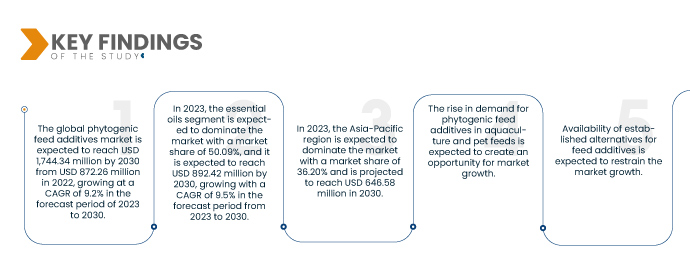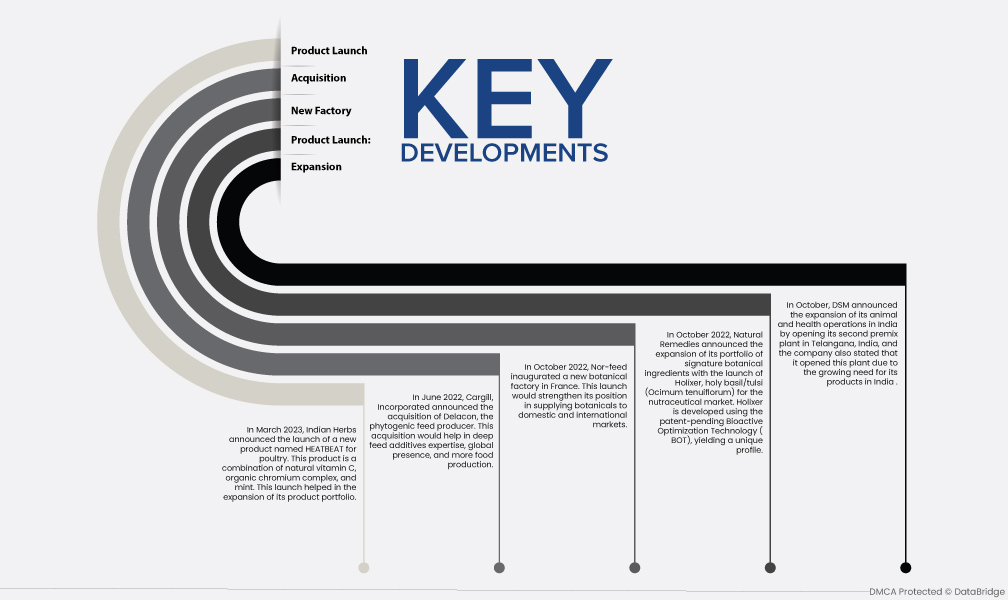Livestock diseases increase the risk to human health, reduce productivity and profit, and disrupt the economy and international trade. They pose a hazard to human health in two ways such as zoonotic diseases and foodborne illnesses. Livestock farmers are choosing natural feed additives such as phytogenic feed additives to decrease disease outbreaks and improve the general health of their animals. Owing to the stringent regulations for antibiotics, natural growth promoters and additives that aid in nutrient sparing, enhanced products, and simplicity of usage in animal feed are in high demand. Livestock farmers are deciding to employ natural feed additives due to illnesses in livestock that pose a serious risk to human health. As a result, the need for natural feed additives that enhance animal performance, health, and welfare is on the rise. Therefore, the global phytogenic feed additives market is estimated to increase rapidly in the near future. In addition, an increase in consumption of animal protein is expected to drive the market growth.
Access Full Report @ https://www.databridgemarketresearch.com/reports/global-phytogenic-feed-additives-market
Data Bridge Market Research analyzes that the Global Phytogenic Feed Additives Market is expected to grow at a CAGR of 9.2% in the forecast period of 2023 to 2030 and is expected to reach USD 1,744.34 million by 2030.
Key Findings of the Study
Increase in the consumption of animal protein is expected to drive the market growth rate
Complete proteins or all of the necessary amino acids that our bodies require, are found in animal proteins such as meat, eggs, and milk. The best sources of protein are those that are found in animal products. In addition, animal protein provides various health advantages. In contrast to red meat, low-fat forms of animal protein such as chicken and fish reduced the incidence of type 2 diabetes, heart disease, colorectal cancer, stomach cancer, pancreatic cancer, and prostate cancer, and improved weight management. Protein is essential for developing, maintaining, and repairing bodily tissues. It is urgently necessary to address the problem of protein deficiency, which has made people more conscious of the need to eat more protein-rich foods such as meat. Globally, meat consumption has expanded in recent years, mostly due to population growth and increased income in emerging nations. The demand for more nutrient-dense, balanced, and better meals is rising along with the world population. A balanced, healthy diet must include a variety of animal-based proteins since they are very nutrient-dense. Numerous cultures value consuming animals, meals, and other items made from animals that are crucial for their socioeconomic well-being. Thus, consumers are shifting towards animal proteins, which will increase the production of protein-rich meats and the usage of natural feed additives. These factors are expected to drive market growth.
Report Scope and Market Segmentation
|
Report Metric
|
Details
|
|
Forecast Period
|
2023 to 2030
|
|
Base Year
|
2022
|
|
Historic Year
|
2021 (Customizable to 2015 - 2020)
|
|
Quantitative Units
|
Revenue in USD Million
|
|
Segments Covered
|
Type (Essential Oils, Flavonoids, Saponins, Oleoresins, Tannins, and Others), Type of Animal Feed (Poultry Feed, Ruminants Feed, Aqua Feed, Swine Feed, and Others), Sources (Herbs and Spices), Form (Dry and Liquid), Function (Performance Enhancers, Antimicrobial Properties, Palatability Enhancers, Digestion Enhancers, and Others)
|
|
Countries Covered
|
U.S., Canada, and Mexico, Germany, France, U.K., Netherlands, Switzerland, Belgium, Russia, Italy, Spain, Poland, Denmark, Sweden, Turkey, and rest of Europe, China, Japan, India, South Korea, Singapore, Malaysia, Australia, New Zealand, Vietnam, Thailand, Indonesia, Philippines, and rest of Asia-Pacific, Saudi Arabia, U.A.E., Kuwait, Oman, Qatar, South Africa, and rest of Middle East and Africa, Brazil, Argentina, and rest of South America
|
|
Market Players Covered
|
Cargill, Incorporated (U.S.), DSM (Netherlands), Kemin Industries, Inc. (U.S.), ADM (U.S.), Nutreco (India), Natural Remedies (India), Himalaya Wellness Company (India), Vinayak Ingredients India (India), Silvateam S.p.a. (Italy), Phytobiotics Futterzusatzstoffe GmbH (Germany), Tegasa (Spain), MIAVIT GMBH (Germany), Indian Herbs (India), Customer DOSTOFARM GmbH (Germany), British Horse Feeds (U.K.), Orffa (Netherlands), Igusol (Spain), Glamac International Private Limited (India), and Nor-Feed (France)
|
|
Data Points Covered in the Report
|
In addition to the insights on market scenarios such as market value, growth rate, segmentation, geographical coverage, and major players, the market reports curated by the Data Bridge Market Research also include depth expert analysis, patient epidemiology, pipeline analysis, pricing analysis, and regulatory framework
|
Segment Analysis
The global phytogenic feed additives market is segmented into five notable segments based on type, type of animal feed, sources, form, and function.
- On the basis of type, the market is segmented into essential oils, flavonoids, saponins, oleoresins, tannins, and others. In 2023, the essential oils segment is expected to dominate the market with a market share of 50.09%.
In 2023, the essential oils segment of type is expected to dominate the market owing to the rise in demand for natural feed additives.
- On the basis of type of animal feed, the market is segmented into poultry feed, ruminants feed, aqua feed, swine feed, and others. In 2023, the poultry feed segment is expected to dominate the market with a market share of 44.84%.
- On the basis of sources, the market is segmented into herbs and spices. In 2023, the herbs segment is expected to dominate the market with a market share of 67.24%.
In 2023, the herbs segment of sources is expected to dominate the market due to the rise in demand for natural feed additives.
- On the basis of form, the market is segmented into dry and liquid. In 2023, the dry segment is expected to dominate the market with a market share of 68.81%.
- On the basis of function, the market is segmented into performance enhancers, antimicrobial properties, palatability enhancers, digestion enhancers, and others. In 2023, the antimicrobial properties segment is expected to dominate the market with a market share of 38.39%.
Major Players
Data Bridge Market Research recognizes the following companies as the major players in the global phytogenic feed additives market that include Cargill, Incorporated (U.S.), DSM (Netherlands), Kemin Industries, Inc. (U.S.), ADM (U.S.), Nutreco (India), Natural Remedies (India), Himalaya Wellness Company (India), Vinayak Ingredients India (India), Silvateam S.p.a. (Italy), Phytobiotics Futterzusatzstoffe GmbH (Germany), Tegasa (Spain), MIAVIT GMBH (Germany), Indian Herbs (India), Customer DOSTOFARM GmbH (Germany), British Horse Feeds (U.K.), Orffa (Netherlands), Igusol (Spain), Glamac International Private Limited (India), and Nor-Feed (France) among others.
Market Development
- In March 2023, Indian Herbs announced the launch of a new product named HEATBEAT for poultry. This product is a combination of natural vitamin C, organic chromium complex, and mint. This launch helped in the expansion of its product portfolio.
- In June 2022, Cargill, Incorporated announced the acquisition of Delacon, the phytogenic feed producer. This acquisition would help in deep feed additives expertise, global presence, and more food production.
- In October 2022, Nor-feed inaugurated a new botanical factory in France. This launch would strengthen its position in supplying botanicals to domestic and international markets.
- In October 2022, Natural Remedies announced the expansion of its portfolio of signature botanical ingredients with the launch of Holixer, holy basil/tulsi (Ocimum tenuiflorum) for the nutraceutical market. Holixer is developed using the patent-pending Bioactive Optimization Technology (BOT), yielding a unique profile.
- In October, DSM announced the expansion of its animal and health operations in India by opening its second premix plant in Telangana, India, and the company also stated that it opened this plant due to the growing need for its products in India.
Regional Analysis
Geographically, the countries covered in the global phytogenic feed additives market are the U.S., Canada, and Mexico, Germany, France, U.K., Netherlands, Switzerland, Belgium, Russia, Italy, Spain, Poland, Denmark, Sweden, Turkey, and rest of Europe, China, Japan, India, South Korea, Singapore, Malaysia, Australia, New Zealand, Vietnam, Thailand, Indonesia, Philippines, and rest of Asia-Pacific, Saudi Arabia, U.A.E., Kuwait, Oman, Qatar, South Africa, and rest of Middle East and Africa, Brazil, Argentina, and rest of South America.
As per Data Bridge Market Research analysis:
Asia-Pacific is the dominant and fastest-growing region in the global phytogenic feed additives market during the forecast period of 2023-2030
The Asia-Pacific region is expected to dominate the global phytogenic feed additives market due to increasing meat consumption and demand for meat. In addition, an increase in livestock farming will provide a wide range of opportunities for phytogenic feed additives to be used for animal nutrition and health, which is expected to drive market growth.
For more detailed information about the global phytogenic feed additives market report, click here – https://www.databridgemarketresearch.com/reports/global-phytogenic-feed-additives-market












